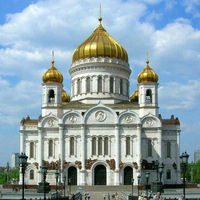— Почему надо отпевать усопших?
— По преданиям святых отцов и духовной практики Св. Церкви, душа усопшего без отпевания не имеет упокоения. Поэтому совершение чина отпевания является очень важным для нее. Вся Церковь, в лице священников и молящихся, просит Господа по Его великой милости простить все прегрешения усопшего и дать ему место упокоения в обителях райских. В разрешительной молитве священник не только просит о прощении души усопшего, но и молит Господа о снятии любого проклятия, тяготеющего над душой предаваемого земле человека.
— Почему у православных такой торжественный чин погребения усопших?
— Потому что тело есть сосуд Святого Духа и провожают близкие не просто тленные останки, но мощи. Предполагается, что любой христианин стремился жить свято, но, как всякий человек в этой жизни, погрешал. Об этом и молится Церковь, чтобы Господь простил грехи усопшего.
— Почему после смерти человека необходимо подавать в храме на сорокоуст об его упокоении?
— Св. Василий Великий пишет, что человеческая душа до третьего дня находится при теле, в связи с этим и хоронят его на третий день по упокоении. Когда в церкви запечатывается гроб с телом, душа в этот момент отходит от человека. После девятого дня она проходит мытарства, а другими словами — 20 судов. Пройти мытарства душа сможет в том случае, если человек вел праведный и благочестивый образ жизни. Иначе она будет осуждена. Поэтому в церкви читается сорокоуст об упокоении, тем самым мы сопровождаем душу человека молитвенным ходатайством перед Богом.
В прежние времена христиане после смерти ближнего все 40 дней читали Псалтирь за умершего и каждый день брали в своей церкви на литургии просфоры за усопшего. Этим самым они оказывали его душе большую помощь. Здесь уместно заметить, что нет выше той молитвы на земле, чем молитва священника при совершении Таинства Проскомидии, когда он произносит имя православного христианина и вынимает частицу из просфоры. Поэтому нужно сразу в церкви заказать сорокоуст о упокоении ближнего и подать имя усопшего для поминовения на Проскомидии. Чем в большем количестве храмов и монастырей поминается душа усопшего, тем больше для нее пользы, а также для души того, кто подает на поминовение.
— Если умерший при жизни никогда не исповедовался, не причащался, не постился, будет ли ему польза оттого, что после смерти к нему приведут священника?
— Дела без веры — мертвы. Но священники такой обряд совершают над всеми, так как оставляют все на Суд и промысел Божий, на то, как Богу угодно поступить с душой грешника…Случается, что мы видели только плохие дела человека при его жизни, но не видели, когда он каялся в своих поступках. А Бог все это видел и знает, поэтому Бог с этой человеческой душой распорядится по Своей Воле.
Однажды к одному архимандриту, служившему в Тульской области, обратились люди из руководящих партийных кругов с просьбой причастить дедушку. Это было в начале 60-х годов — во времена жесточайших гонений на Церковь, когда за тайное крещение, причастие на дому и даже за небольшой ремонт храма сажали в тюрьму или заключали в психбольницу. Поэтому вполне возможно, что это могла быть провокация. Но молодые люди убедительно настаивали поехать с ними, говоря, что их дедушка умирает и не может умереть. Неоднократно его мертвым клали в гроб и каждый раз, к ужасу окружающих, он вставал из гроба, требуя привести священника для причастия и объясняя, что как только он умирает, к нему приходят все убиенные и замученные им во главе с тремя священниками, которых он расстрелял, и говорят ему: “Возвращайся, исповедуйся и причастись Тела и Крови Христовых, ибо мы вымолили твою душу у Бога”.
Близкие старика позвали местного священника, но тот, услышав в каких грехах повинен этот человек, отказался читать разрешительную молитву и сказал: “Я не могу разрешить от таких грехов. Ищите монаха…”.
После продолжительной беседы старец согласился поехать к умирающему. Перед исповедью, как положено по правилам, архимандрит попросил всех стоящих в комнате выйти, но умирающий, указывая на молодого человека, приехавшего вместе со старцем, сказал: “Пусть он останется и слышит все, ему это нужно…”. “Более страшной исповеди и в то же время более полной, — пишет архимандрит Георгий, — я никогда в своей жизни не слышал”.
После того как ярый атеист покаялся, старец прочитал разрешительную молитву и причастил умирающего. Перед смертью этот старый человек, познавший истину под страхом проклятия, завещал своим родственникам отпеть его в храме и похоронить под деревянным крестом, и чтобы никакого памятника не ставили. Так и сделали — отпевали его в церкви.
— Кого нельзя отпевать в православных храмах?
— По Уставу Церкви нельзя совершать православные обряды погребения и церковного поминовения людей некрещеных, крещеных, но отрекшихся от веры (еретиков), которые при жизни относились к Церкви с насмешкой, враждой, или, считаясь православными, увлеклись восточными религиями. Раньше таких людей отлучали от Церкви (провозглашали анафему) — ныне такое делается очень редко, но эти люди отлучили себя от Церкви сами. Церковь молится лишь за тех, кто признает Православную Церковь за Церковь истинную.
Не совершается церковное отпевание самоубийц. Наша Церковь отказывает в этом даже людям, покушавшимся на жизнь или имущество ближних и умерших от ран и увечий, полученных в результате отпора. Отпеваются в этом случае только воины, погибшие на поле брани. Их послали защищать свое Отечество и они погибли мученической смертью, выполнив свой воинский долг.
(по материалам православных газет)
— По преданиям святых отцов и духовной практики Св. Церкви, душа усопшего без отпевания не имеет упокоения. Поэтому совершение чина отпевания является очень важным для нее. Вся Церковь, в лице священников и молящихся, просит Господа по Его великой милости простить все прегрешения усопшего и дать ему место упокоения в обителях райских. В разрешительной молитве священник не только просит о прощении души усопшего, но и молит Господа о снятии любого проклятия, тяготеющего над душой предаваемого земле человека.
— Почему у православных такой торжественный чин погребения усопших?
— Потому что тело есть сосуд Святого Духа и провожают близкие не просто тленные останки, но мощи. Предполагается, что любой христианин стремился жить свято, но, как всякий человек в этой жизни, погрешал. Об этом и молится Церковь, чтобы Господь простил грехи усопшего.
— Почему после смерти человека необходимо подавать в храме на сорокоуст об его упокоении?
— Св. Василий Великий пишет, что человеческая душа до третьего дня находится при теле, в связи с этим и хоронят его на третий день по упокоении. Когда в церкви запечатывается гроб с телом, душа в этот момент отходит от человека. После девятого дня она проходит мытарства, а другими словами — 20 судов. Пройти мытарства душа сможет в том случае, если человек вел праведный и благочестивый образ жизни. Иначе она будет осуждена. Поэтому в церкви читается сорокоуст об упокоении, тем самым мы сопровождаем душу человека молитвенным ходатайством перед Богом.
В прежние времена христиане после смерти ближнего все 40 дней читали Псалтирь за умершего и каждый день брали в своей церкви на литургии просфоры за усопшего. Этим самым они оказывали его душе большую помощь. Здесь уместно заметить, что нет выше той молитвы на земле, чем молитва священника при совершении Таинства Проскомидии, когда он произносит имя православного христианина и вынимает частицу из просфоры. Поэтому нужно сразу в церкви заказать сорокоуст о упокоении ближнего и подать имя усопшего для поминовения на Проскомидии. Чем в большем количестве храмов и монастырей поминается душа усопшего, тем больше для нее пользы, а также для души того, кто подает на поминовение.
— Если умерший при жизни никогда не исповедовался, не причащался, не постился, будет ли ему польза оттого, что после смерти к нему приведут священника?
— Дела без веры — мертвы. Но священники такой обряд совершают над всеми, так как оставляют все на Суд и промысел Божий, на то, как Богу угодно поступить с душой грешника…Случается, что мы видели только плохие дела человека при его жизни, но не видели, когда он каялся в своих поступках. А Бог все это видел и знает, поэтому Бог с этой человеческой душой распорядится по Своей Воле.
Однажды к одному архимандриту, служившему в Тульской области, обратились люди из руководящих партийных кругов с просьбой причастить дедушку. Это было в начале 60-х годов — во времена жесточайших гонений на Церковь, когда за тайное крещение, причастие на дому и даже за небольшой ремонт храма сажали в тюрьму или заключали в психбольницу. Поэтому вполне возможно, что это могла быть провокация. Но молодые люди убедительно настаивали поехать с ними, говоря, что их дедушка умирает и не может умереть. Неоднократно его мертвым клали в гроб и каждый раз, к ужасу окружающих, он вставал из гроба, требуя привести священника для причастия и объясняя, что как только он умирает, к нему приходят все убиенные и замученные им во главе с тремя священниками, которых он расстрелял, и говорят ему: “Возвращайся, исповедуйся и причастись Тела и Крови Христовых, ибо мы вымолили твою душу у Бога”.
Близкие старика позвали местного священника, но тот, услышав в каких грехах повинен этот человек, отказался читать разрешительную молитву и сказал: “Я не могу разрешить от таких грехов. Ищите монаха…”.
После продолжительной беседы старец согласился поехать к умирающему. Перед исповедью, как положено по правилам, архимандрит попросил всех стоящих в комнате выйти, но умирающий, указывая на молодого человека, приехавшего вместе со старцем, сказал: “Пусть он останется и слышит все, ему это нужно…”. “Более страшной исповеди и в то же время более полной, — пишет архимандрит Георгий, — я никогда в своей жизни не слышал”.
После того как ярый атеист покаялся, старец прочитал разрешительную молитву и причастил умирающего. Перед смертью этот старый человек, познавший истину под страхом проклятия, завещал своим родственникам отпеть его в храме и похоронить под деревянным крестом, и чтобы никакого памятника не ставили. Так и сделали — отпевали его в церкви.
— Кого нельзя отпевать в православных храмах?
— По Уставу Церкви нельзя совершать православные обряды погребения и церковного поминовения людей некрещеных, крещеных, но отрекшихся от веры (еретиков), которые при жизни относились к Церкви с насмешкой, враждой, или, считаясь православными, увлеклись восточными религиями. Раньше таких людей отлучали от Церкви (провозглашали анафему) — ныне такое делается очень редко, но эти люди отлучили себя от Церкви сами. Церковь молится лишь за тех, кто признает Православную Церковь за Церковь истинную.
Не совершается церковное отпевание самоубийц. Наша Церковь отказывает в этом даже людям, покушавшимся на жизнь или имущество ближних и умерших от ран и увечий, полученных в результате отпора. Отпеваются в этом случае только воины, погибшие на поле брани. Их послали защищать свое Отечество и они погибли мученической смертью, выполнив свой воинский долг.
(по материалам православных газет)
- Why is it necessary to funeral for the dead?
- According to the traditions of the Holy Fathers and the spiritual practice of the Holy Church, the soul of the deceased without burial has no rest. Therefore, the performance of the funeral service is very important for her. The whole Church, in the person of priests and worshipers, asks the Lord by His great mercy to forgive all the sins of the deceased and give him a resting place in the heavenly abodes. In permissive prayer, the priest not only asks for forgiveness of the soul of the deceased, but also prays to the Lord for the removal of any curse that gravitates over the soul of a person being interred in the earth.
- Why do the Orthodox have such a solemn rite of burial of the deceased?
- Because the body is a vessel of the Holy Spirit and the loved ones escort not just corruptible remains, but relics. It is assumed that any Christian sought to live a holy life, but, like every person in this life, he sinned. The Church also prays for this, that the Lord forgave the sins of the deceased.
- Why, after the death of a person, is it necessary to submit to the magpie in the temple about his repose?
- St. Basil the Great writes that the human soul is with the body until the third day, and therefore they bury it on the third day upon repose. When the coffin with the body is sealed in the church, the soul at this moment departs from the person. After the ninth day, she goes through ordeals, and in other words - 20 ships. The soul will be able to go through the ordeal if a person led a righteous and pious lifestyle. Otherwise, she will be condemned. Therefore, a magpie is read in the church about repose, thereby we accompany the soul of a person with a prayer intercession to God.
In former times, after the death of a neighbor, Christians read the Psalter for the deceased for 40 days and every day they took prosphora for the deceased in their church at the liturgy. With this, they rendered his soul a great help. It is appropriate to note that there is no higher prayer on earth than the priest’s prayer when performing the Sacrament of Proskomidia, when he pronounces the name of an Orthodox Christian and takes out a particle from the prosphora. Therefore, it is necessary to immediately order a magpie in the church about the repose of his neighbor and give the name of the deceased for remembrance at Proskomidia. The more souls of the deceased commemorated in more churches and monasteries, the greater the benefit for her, as well as for the soul of the person who serves for commemoration.
“If the deceased, during his lifetime, never confessed, communed, or fasted, would he benefit if they bring a priest to him after death?”
“Works without faith are dead.” But priests perform such a rite over everyone, because they leave everything to the Judgment and the providence of God, to how God wants to do with the soul of a sinner ... It happens that we saw only the bad deeds of a person during his lifetime, but did not see when he repented of their actions. But God saw and knows all this, therefore God with this human soul will control according to His Will.
Once, one archimandrite, who served in the Tula region, was approached by people from the leading party circles with a request to bring grandfather to communion. This was in the early 60s - during the most severe persecutions of the Church, when they were imprisoned or imprisoned for a secret baptism, communion at home and even for a small repair of the church. Therefore, it is entirely possible that this could be a provocation. But the young people insisted insistently to go with them, saying that their grandfather was dying and could not die. He was repeatedly put dead in a coffin and each time, to the horror of those around him, he got up from the coffin, demanding to bring the priest for communion and explaining that as soon as he dies, all those killed and tortured by him, led by three priests whom he shot, come to him and they say to him: “Come back, confess and partake of the Body and Blood of Christ, for we have prayed for your soul from God.”
Relatives of the old man called a local priest, but he, hearing what sins this person was guilty of, refused to read a permissive prayer and said: “I cannot allow such sins. Seek the monk ... ”
After a long conversation, the elder agreed to go to the dying man. Before the confession, according to the rules, the archimandrite asked everyone standing in the room to go out, but the dying man, pointing to the young man who arrived with the old man, said: “Let him stay and hear everything, he needs it ...”. “A more terrible confession and at the same time more complete,” writes archimandrite George, “I have never heard in my life.”
After the ardent atheist repented, the elder recited a prayer of permission and communed with the dying man. Before his death, this old man, who knew the truth under pain of a curse, bequeathed to his relatives to bury him in the church and bury him under a wooden cross, so that no monument would be erected. So they did - they buried him in the church.
- Who should not be buried in Orthodox churches?
- According to the Charter of the Church, it is impossible to perform Orthodox rites of burial and church commemoration of people who are not baptized, baptized, but who renounced the faith (heretics), who during their life belonged to the Church with mockery, hostility, or, being considered Orthodox, were carried away by Eastern religions. Previously, such people were excommunicated (proclaimed anathema) - now this is
- According to the traditions of the Holy Fathers and the spiritual practice of the Holy Church, the soul of the deceased without burial has no rest. Therefore, the performance of the funeral service is very important for her. The whole Church, in the person of priests and worshipers, asks the Lord by His great mercy to forgive all the sins of the deceased and give him a resting place in the heavenly abodes. In permissive prayer, the priest not only asks for forgiveness of the soul of the deceased, but also prays to the Lord for the removal of any curse that gravitates over the soul of a person being interred in the earth.
- Why do the Orthodox have such a solemn rite of burial of the deceased?
- Because the body is a vessel of the Holy Spirit and the loved ones escort not just corruptible remains, but relics. It is assumed that any Christian sought to live a holy life, but, like every person in this life, he sinned. The Church also prays for this, that the Lord forgave the sins of the deceased.
- Why, after the death of a person, is it necessary to submit to the magpie in the temple about his repose?
- St. Basil the Great writes that the human soul is with the body until the third day, and therefore they bury it on the third day upon repose. When the coffin with the body is sealed in the church, the soul at this moment departs from the person. After the ninth day, she goes through ordeals, and in other words - 20 ships. The soul will be able to go through the ordeal if a person led a righteous and pious lifestyle. Otherwise, she will be condemned. Therefore, a magpie is read in the church about repose, thereby we accompany the soul of a person with a prayer intercession to God.
In former times, after the death of a neighbor, Christians read the Psalter for the deceased for 40 days and every day they took prosphora for the deceased in their church at the liturgy. With this, they rendered his soul a great help. It is appropriate to note that there is no higher prayer on earth than the priest’s prayer when performing the Sacrament of Proskomidia, when he pronounces the name of an Orthodox Christian and takes out a particle from the prosphora. Therefore, it is necessary to immediately order a magpie in the church about the repose of his neighbor and give the name of the deceased for remembrance at Proskomidia. The more souls of the deceased commemorated in more churches and monasteries, the greater the benefit for her, as well as for the soul of the person who serves for commemoration.
“If the deceased, during his lifetime, never confessed, communed, or fasted, would he benefit if they bring a priest to him after death?”
“Works without faith are dead.” But priests perform such a rite over everyone, because they leave everything to the Judgment and the providence of God, to how God wants to do with the soul of a sinner ... It happens that we saw only the bad deeds of a person during his lifetime, but did not see when he repented of their actions. But God saw and knows all this, therefore God with this human soul will control according to His Will.
Once, one archimandrite, who served in the Tula region, was approached by people from the leading party circles with a request to bring grandfather to communion. This was in the early 60s - during the most severe persecutions of the Church, when they were imprisoned or imprisoned for a secret baptism, communion at home and even for a small repair of the church. Therefore, it is entirely possible that this could be a provocation. But the young people insisted insistently to go with them, saying that their grandfather was dying and could not die. He was repeatedly put dead in a coffin and each time, to the horror of those around him, he got up from the coffin, demanding to bring the priest for communion and explaining that as soon as he dies, all those killed and tortured by him, led by three priests whom he shot, come to him and they say to him: “Come back, confess and partake of the Body and Blood of Christ, for we have prayed for your soul from God.”
Relatives of the old man called a local priest, but he, hearing what sins this person was guilty of, refused to read a permissive prayer and said: “I cannot allow such sins. Seek the monk ... ”
After a long conversation, the elder agreed to go to the dying man. Before the confession, according to the rules, the archimandrite asked everyone standing in the room to go out, but the dying man, pointing to the young man who arrived with the old man, said: “Let him stay and hear everything, he needs it ...”. “A more terrible confession and at the same time more complete,” writes archimandrite George, “I have never heard in my life.”
After the ardent atheist repented, the elder recited a prayer of permission and communed with the dying man. Before his death, this old man, who knew the truth under pain of a curse, bequeathed to his relatives to bury him in the church and bury him under a wooden cross, so that no monument would be erected. So they did - they buried him in the church.
- Who should not be buried in Orthodox churches?
- According to the Charter of the Church, it is impossible to perform Orthodox rites of burial and church commemoration of people who are not baptized, baptized, but who renounced the faith (heretics), who during their life belonged to the Church with mockery, hostility, or, being considered Orthodox, were carried away by Eastern religions. Previously, such people were excommunicated (proclaimed anathema) - now this is

У записи 9 лайков,
0 репостов,
296 просмотров.
0 репостов,
296 просмотров.
Эту запись оставил(а) на своей стене Вероника Вовденко






























